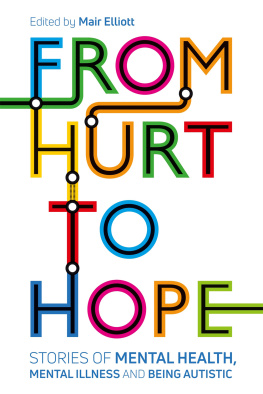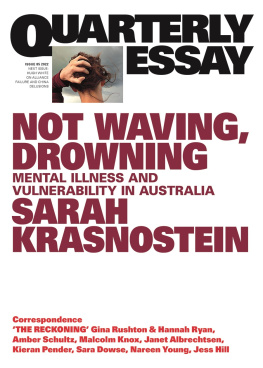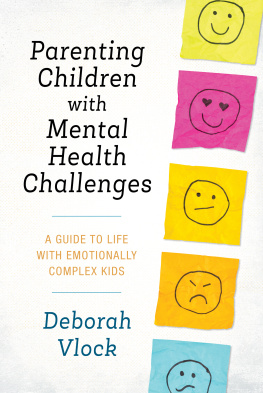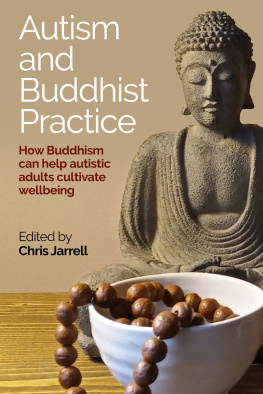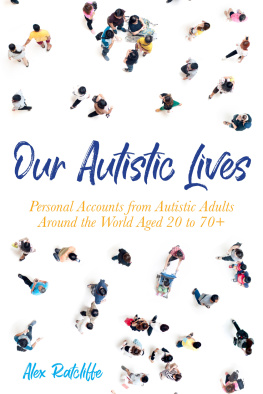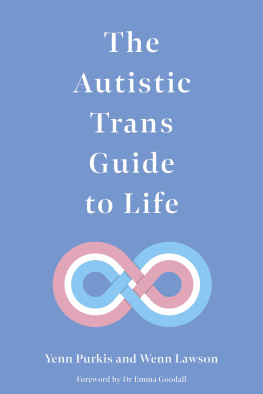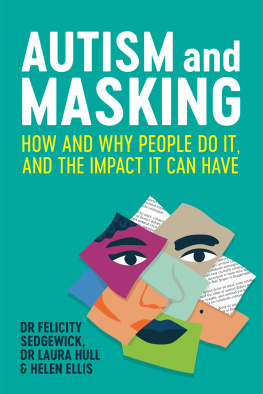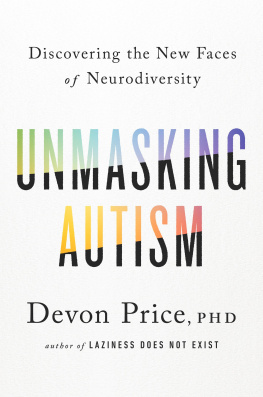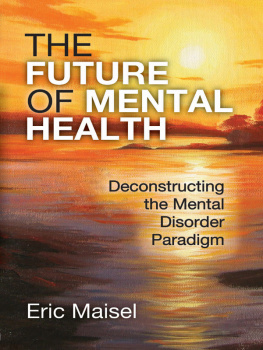Contents
Page list

of related interest
Supporting Autistic People with Eating Disorders
A Guide to Adapting Treatment and Supporting Recovery
Edited by Kate Tchanturia
ISBN 978 1 78775 445 4
eISBN 978 1 78775 446 1
A Clinicians Guide to Mental Health Conditions in Adults with Autism Spectrum Disorders
Assessment and Interventions
Edited by Eddie Chaplin, Debbie Spain and Jane McCarthy
ISBN 978 1 78592 426 2
eISBN 978 1 78450 800 5
Living with PTSD on the Autism Spectrum
Insightful Analysis with Practical Applications
Lisa Morgan, MEd and Mary P. Donahue, PhD
Foreword by Tony Attwood
ISBN 978 1 78775 050 0
eISBN 978 1 78775 085 2
A Practical Guide to Happiness in Adults on the Autism Spectrum
A Positive Psychology Approach
Victoria Honeybourne
ISBN 978 1 78592 577 1
eISBN 978 1 78450 988 0
A Guide to Mental Health Issues in Girls and Young Women on the Autism Spectrum
Diagnosis, Intervention and Family Support
Dr Judy Eaton
ISBN 978 1 78592 092 9
eISBN 978 1 78450 355 0
From Hurt
to Hope
Stories of Mental Health,
Mental Illness and Being Autistic
EDITED BY MAIR ELLIOTT

First published in Great Britain in 2022 by Jessica Kingsley Publishers
An Hachette Company
Copyright Jessica Kingsley Publishers 2022
The right of Mair Elliott to be identified as the Author of the Work has been asserted by her in accordance with the Copyright, Designs and Patents Act 1988.
All rights reserved. No part of this publication may be reproduced, stored in a retrieval system, or transmitted, in any form or by any means without the prior written permission of the publisher, nor be otherwise circulated in any form of binding or cover other than that in which it is published and without a similar condition being imposed on the subsequent purchaser.
The information contained in this book is not intended to replace the services of trained medical professionals or to be a substitute for medical advice. The complementary therapy described in this book may not be suitable for everyone to follow. You are advised to consult a doctor before embarking on any complementary therapy programme and on any matters relating to your health, and in particular on any matters that may require diagnosis or medical attention.
Trigger warning: This book mentions abuse, alcohol, anxiety, self-harm, eating disorders and trauma.
A CIP catalogue record for this title is available from the British Library and the Library of Congress
ISBN 978 1 78775 585 7
eISBN 978 1 78775 586 4
Jessica Kingsley Publishers policy is to use papers that are natural, renewable and recyclable products and made from wood grown in sustainable forests. The logging and manufacturing processes are expected to conform to the environmental regulations of the country of origin.
Jessica Kingsley Publishers
Carmelite House
50 Victoria Embankment
London EC4Y 0DZ
www.jkp.com
To those who Helped me through my Hurt
and gave me the opportunity to find Hope.
My dearest family, Beth, Antonia, Lizzie, Tanya, Mrs Tomlin,
Mrs Gregson, Mrs Phillips and many more.
Contents
Introduction
Dear reader, may I take the opportunity to give you some background information before you go on to read the poignant stories that lie ahead in this book?
I started this project with the naive thought that it would be easy. Over the year in which I have been running this project, I have laughed, cried, screamed and raged. I have done a lot of campaign work, and I have worked with many people and organizations, but perhaps this project really hit home the difficulty of straddling both sides of the argument. I am autistic and a keen supporter of progressive societal change to end the injustices experienced by the neurodivergent, disabled and others. But I am also part of the institution because of the organizations I have worked with and for. I understand and represent both sides that society needs to change, and that change takes time. I have tried to walk the tightrope to please both parties. I have, as always, trusted my gut and done what I thought to be right.
While in discussion with the publishers I suggested including as many different autistic voices as I could. Since my autism diagnosis I have found solace, relief, camaraderie, humour, annoyance and more in the online autism community. The community has helped me understand myself as an autistic person, supported me in my darkest hours and celebrated with me during triumphs, large or small. I know and feel the power of belonging to a community that understands you. I wanted to take a small piece of that and put it into a book.
The instructions given to each author were to write an essay based on personal experiences of autism and mental health/mental illness/mental health difficulties. These essays needed to cover the topics of hurt (the authors experiences and how they felt), help (what has helped them) and hope (what gives them hope). Finally, I emphasized the need to express the human nuances of their experiences, to counter the dominant clinical view of autism.
The essays submitted were beyond what I could have hoped for. Touching, heart-wrenching, humorous, anger-inducing, informative, challenging and more. I wish I could have accepted all submissions. In the end, I had to make tough choices and pick the essays most suitable for this project. I would like to thank everyone who expressed an interest and/or submitted an essay.
Ten contributors were chosen to be included, and over the collection many topics are explored. But first, perhaps I should briefly explain autism in case you are new to the field. Autism is a neurodevelopmental disorder characterized by communication and sensory differences. Autism affects how a person perceives and interacts with the world around them. Roughly 1 in 160 people are autistic worldwide. It is a spectrum condition with a wide variation between individual autistic people in how their autism affects them.
Most clinical texts about autism will use medical language and will suggest deficiency, disorder and, generally, a lack of humanness. However, many of us subscribe to a different way of describing ourselves. Neurodiversity, a concept coined by J. Singer in 1998, explains autism as a difference not a defect, a much-needed variation in the population in how people engage and interact with the world. However, living in a world designed for a different kind of brain brings its challenges; many of us struggle with the sensory onslaught of modern life, we are often ostracized or misunderstood due to our alternative ways of communicating, and we are frequently unable to access basic services and infrastructure in order to live our lives with maximum health and happiness. I will expand on this a little further later on.
The term neurodiverse refers to all people; neurodivergent refers to those who have neurological difference, such as autism, attention deficit hyperactivity disorder (ADHD) and learning disabilities. Neurotypical is the term describing all people who are not neurodivergent. You may have come across other terms as well, such as high functioning and low functioning, Aspergers syndrome and the spectrum. All are references to autism; some are references to specific groups of autistic people. High-functioning autism and Aspergers syndrome refer to people who are autistic and society deems to be most able to live relatively normally. Low-functioning autism refers to autistic people society deems to be least able to live normal lives. Now I must stress that these assumptions are made in the context of a specific way of understanding what normal is and a very specific societal structure. These are also assumptions that are predominantly made by neurotypical people. Autistic people tend not to like using functioning labels to describe themselves because autism isnt as simple as two polar opposite morphs. To give an example, I have a friend who, like me, has been able to gain employment, has sat on many different boards and committees, has done a lot of public speaking, has competed at a high level in sport, and is capable and ready to move into independent living. I am considered to be high functioning, he is considered to be low functioning. We are not polar opposites though, but the functioning labels suggest we are. What is worse, he may be prevented from realizing his potential because the system assumes that due to his functioning label he cannot achieve, and I may not get the support I need because it is assumed from my functioning label that I can cope.

